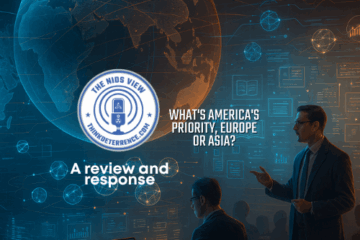Recently, Japan and South Korea began discussing the need for their own indigenous nuclear arsenals. Either or both might yet decide in favor of fielding their own nuclear forces. Australia has not openly talked about pursuing nuclear weapons, but as an American ally in Asia such a move may become necessary.
A driving factor is the rising nuclear threat posed by China, North Korea, and Russia. Such a threat requires effective nuclear deterrence. Another concern is continuing doubts as to whether America’s extended deterrence is reliable in a serious international crisis or a major shooting war.
It is true that when authoritarian states brandish their nuclear arsenals for coercion, repeatedly threatening nuclear attack, any nation would be concerned and look to its guarantor of security for help. Unfortunately, the United States is proving slow to field the kind of arsenal that can not only deter or defeat aggression against itself, but also provide that same capability for almost three dozen allies.
The US is now in a position where it must modernize and expand its own nuclear arsenal and right-size those numbers to sustain dynamic parity with adversaries. Legally and morally, there is indeed an inescapable duty to deter. For Japan and South Korea, that duty will be met by the United States or themselves.
Nuclear participation by America’s allies in Asia would be in direct contravention to US policy, and would violate both the letter and the spirit of the 1970 Non-Proliferation Treaty (NPT), but it would certainly prove understandable. Australia, Japan, and South Korea all signed the treaty, but a voracious and aggressive China and North Korea are proving a real threat to all three states.
Rather than take a position for or against ally nuclear participation, an overview of the main arguments on both sides of the issue are instructive.
Pros
First, recall that Australia, Japan, and South Korea all have a level of experience with the nuclear issue. Japan, of course, faced atomic bombings of Hiroshima and Nagasaki. But, as Japan up-arms to deter China and North Korea, Tokyo might decide to field its own nuclear weapons.
Southern and western Australia were the sites of over a dozen British nuclear weapon tests between 1952 and 1963. This is a fact too few understand.
South Korea had its own nuclear weapon research and development program during the Cold War, which was abandoned because of American pressure. South Korea does rely on nuclear power for its generation of electricity.
Second, note that these American allies do possess civilian nuclear power industries, sophisticated militaries, sizable economies, and advanced science and technology capabilities. All three countries could build nuclear weapons in relatively short order. On the positive side, the fielding of Australian, Japanese, and South Korean nuclear forces would make aggression far more complicated for China and North Korea.
The inclusion of allied nuclear forces would disperse and diversify the collective nuclear deterrent available for employment and increase the number of targets China or North Korea must strike in a conflict. Allied nuclear participation is also an alternative to overseas nuclear basing agreements, like those that existed during the Cold War. Given the lack of available American weapons, such an arrangement could prove very beneficial.
Lastly, nuclear participation would put an end to the endless debate over the credibility of American extended deterrence. Rather, the focus would turn to integrating nuclear forces in the event of a conflict.
Cons
There are some well-known arguments for continued nuclear nonproliferation. They include the longtime prohibition in US policy and the NPT prohibition against it. There are also pragmatic concerns.
First, if a country were to withdraw from the NPT, although allowed by Article X, it would create significant diplomatic tensions between the US and the country withdrawing from the treaty. American sanctions could significantly harm the economy of Australia, Japan, or South Korea.
Second, any democratic state pursuing nuclear weapons would undermine Western efforts to halt Iran’s nuclear weapons development. Worse, it could open the floodgates of nuclear proliferation among states that are certain to prove less responsible with those weapons.
Third, China might see the pursuit of nuclear weapons by American allies as a sufficient reason to launch a “defensive” nuclear strike. China’s “active defense” strategy clearly supports the use of preventive attacks.
Fourth, the Nuclear Supplier’s Group would end all support to the civilian nuclear programs of Australia, Japan, and/or South Korea. Such a decision would cause great difficulty for power generators.
Conclusion
For Australia, American promises and the continent’s geographic position may prove sufficient to prevent a move to a nuclear weapons program. For Japan and South Korea, the threat is much closer. How these countries evaluate the threat is yet to be determined. They are signaling the United States that they want stronger assurances of American commitment.
Such assurance will prove difficult for the United States for many reasons. Neither China nor North Korea should take for granted that America’s allies will remain under the nuclear umbrella. It is only because of flagrant aggression that South Korea, and most recently, Japan, are even talking about the need for indigenous nuclear forces.
Joe Buff is a Senior Fellow at the National Institute for Deterrence Studies. Views expressed are his own.
About the Author

Joe Buff
Joe buff has long experience researching practical applications in math and actuarial science, management consulting, and national defense. His award-winning publications include six best-selling submarine technothrillers (the Captain Jeffrey Fuller series), and numerous articles and op-eds about undersea warfare, geostrategy, and nuclear deterrence in The Submarine Review, American Submariner, the U.S. Naval Institute Proceedings, The Day (New London) and on Military.com’s DefenseTech blog. Joe has presented to the Naval Submarine League, the U.S. Submarine Veterans, the U.S. Submarine Museum (Groton) and the New York State Military Museum (Albany). In early 2024 Joe was a guest on ANWA’s NucleCast, hosted by Dr. Adam Lowther, and he has begun authoring and coauthoring articles for the National Institute for Deterrence Studies' Global Security Review.




